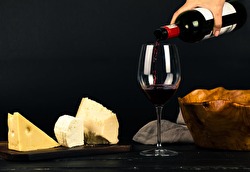
There has never been a more confusing topic than what are the common and customary eating habits in a community, nation, or nation. These beliefs and postulates are based on many misconceptions about nutrition in our time, and from there all the complications that may lead to poor health, consequently diseases or degenerative processes. Only ordinary people who are just called end customers for the big food producers are suffering. These are the ones who obediently follow all promotions and obey what one interest or another dictates without them realizing the high price they pay for a cheap food.
My first favorite topic in the nutrition of Bulgarians is the dairy products. According to Chinese medicine, dairy consumption creates prerequisites a "moisture" formation - a mucus that is a thriving environment for any ailments. A mass-circulated delusion is that Bulgarians have always been consuming a lot of dairy products. The truth is that 10 to 15 decades ago, an average Bulgarian family (four-five-person) consumed 25 lb. of white cheese a year. Milk has almost been cultured and has been rarely consumed raw. Needless to mention that it is highly perishable product and only in the form of a yogurt it has a longer consumption period. A compromise between different types of dairy products has always had to be done, and as a result, their abundance and variety was virtually impossible for a given household.
Next to my list come the eggs (from hens, ducks or other birds). They've never been abundant and we should kept in mind that the hens simply stop laying eggs at certain times of the year (end of summer, for example). My grandmother used to say that the eggs laid between the Palm Sunday and Easter last for 40 days. Also according to her, water is bad for the eggs. Once washed, they are quickly spoiled. Another thing I remember from the time of the summer spent at my grandparents’ is that the egg shells were never thrown away. They were fed to the hens as a calcium dietary supplement for stronger egg shells.
The third place is naturally set for the meat. It is a very popular topic for discussion nowadays. Meat is considered lean and fatty. The lean is the one from small animals (chickens, fish, ducks) and the fatty one of large animals (pigs, sheep, cows). The most common farm animals: hens, sheep/goats, apart from their meat, were also used to produce wool, eggs or milk, and the folks should have chosen one or the other but never both. That's why animals were slaughtered only in very special occasions such as holidays, kurbans and the meat was traditionally preserved for a limited period of time only. The most traditional meat for the winter was pork since the pig farming sole purpose was for meat only. During the spring and summer, lean meat in a much smaller quantity was preferable to have.
In addition to this, let's keep in mind that the Bulgarians have traditionally observed the lents, St. Peter’s day’s, the Virgin Mary’s and the Christmas fasts, which are cover ⅓ of the year. Additionally, every week, on Wednesdays and Fridays, and animal products weren’t consumed either. This increases the number of fasting days to a half of the calendar year. Everyone knows that children, sick and pregnant and lactating mothers are excluded from the strict fasting which nevertheless reduces the animal food for the others in the household.
In order to avoid the blame for this post targeting only animal food, I have to point out that even with plant-based food dogmas were quite different. The Bulgarians never had a rich table and only simple foods and dishes were present, predominantly with sauces/broths supping with a dry crust of bread. Literally. Meals were rather a social experience, as Ivan Vazov described it in the first chapter of Under the Yoke.
"Round Marko, his old mother and his buxom wife, were crowded a complete circle of children, great and small, all armed with knives and forks, and ready for a terrible on-slaught on their victuals; they fully personified the Turkish saying: Saman düşmanları”
Here are few words about alcohol. Like the chicken or eggs compromise, a household was to make choices between rakia or wine. The truth is that almost always the latter would prevail, and the results were naturally present. The notorious drink of the gods was drunk in moderation and of cause mentioned by the Patriarch of Bulgarian Literature
"'Set to, young ‘uns. Fill up the jug again, Pena’ And the maid would go to the well, where the great wine jar was cooling, and fill the earthenware jug: while Marko, handing it to the children, would say, ‘Drink, you young rascals!’ and so the jar would go round the table. Eyes brightened, cheeks sparkled, and lips parted in a smile of satisfaction, and Marko would turn to his wife, and seeing a look of disapproval on her face, would say, ‘Let them drink in my presence. I won't stint them of wine- for I don't want them to become drunkards when they grow up’”
Not surprisingly, as a result of this, at the beginning of the 20th century, an American study found that Bulgarians were the healthiest and centenarian most populous nation. Some business interests are trying to give credits for this to the yogurt or the honey. The truth is far from that. The Bulgarians used to live a simple and peaceful life, closely connected to the earth; with warm relationships within the family and the community, a natural lifestyle full of faith and love.
The Bulgarians were exquisite, healthy and long-lived because they were rich in primary foods, which would never let you gain weight. In my practice, I emphasize a lot to the progress of everyone towards the primary food consumption improvement - relationships, work, movement and spirituality.
Your change can begin now. All you have to do is willing it. In order to book your first personal session click here. For your opinion or a question right in the comments below.
